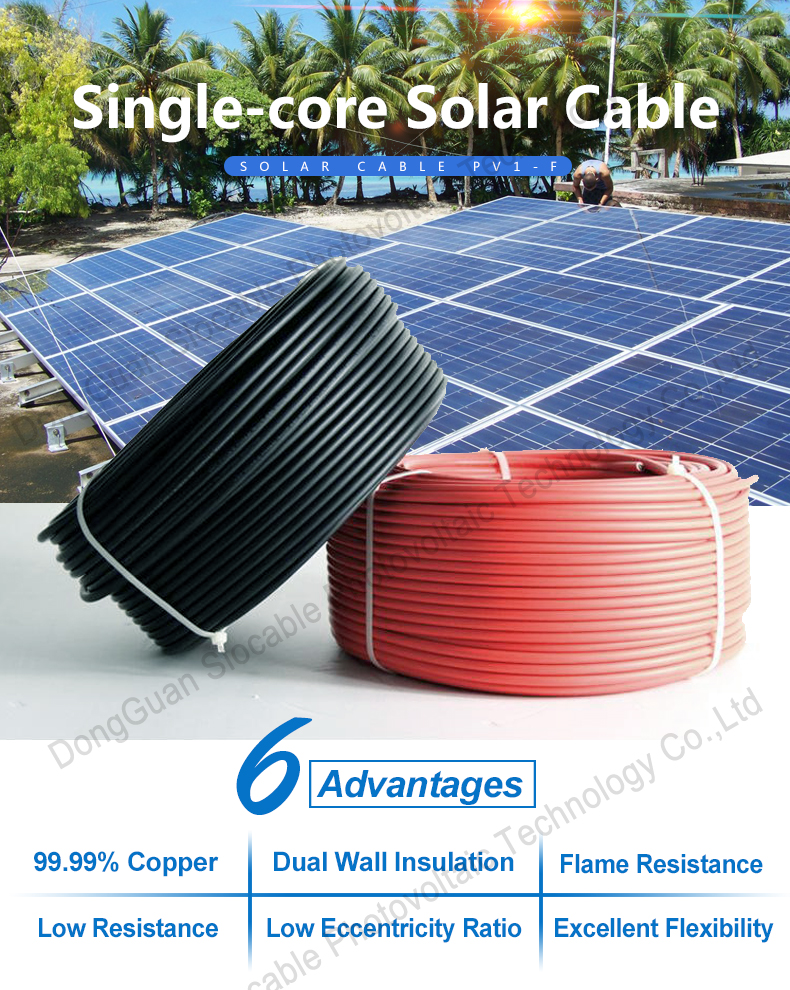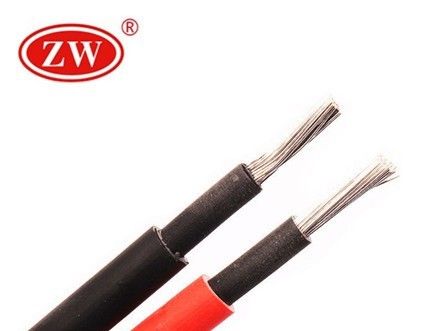Solar cable is a type of electrical cable that is specifically designed for use in solar power applications. Solar cables are made to withstand the harsh conditions that are typically found in solar power installations, such as high temperatures and UV exposure. Solar cables are also typically more flexible than traditional electrical cables, making them easier to install in tight spaces.
Solar cables are available in a variety of sizes and configurations to meet the specific needs of any solar power installation.
Normal cables are not as flexible as solar cables and are not able to withstand the high temperatures and UV exposure. Solar cables are also typically more expensive than traditional electrical cables.
Solar cables are designed to withstand the harsh conditions that are present in a solar installation. They are UV resistant and can withstand high temperatures. Solar cables are also designed to be flexible, which makes them ideal for use in tight spaces.
Normal cables are not designed to withstand the same conditions and are not as flexible, making them less ideal for use in solar installations.

Credit: www.slocable.com.cn
Can I Use Normal Cable for Solar Panels?
No, you cannot use a normal cable for solar panels. Solar panels need a special type of cable that is designed to handle the high current that the panels produce. This type of cable is called “PV” or “photovoltaic” cable.
It is thicker than normal cable and has a higher amp rating.
What Type of Cable is Used for Solar Panels?
There are a few types of solar panel cables, the most common being PV wire and MC4 connectors. PV wire is a type of electrical wire that is specifically designed for use in solar panel systems. It is made of stranded copper wire and has a thick insulation to protect against weather and temperature changes.
MC4 connectors are used to connect solar panels to each other and to the inverter. They are made of durable plastic and can withstand high temperatures.
Do You Need Special Cable for Solar Panels?
No, you don’t need special cable for solar panels. The type of cable you’ll need will depend on the size of your solar panel array and the distance between the array and the battery bank. If you have a small array (1-4 panels) and the distance to the battery bank is short (less than 50 feet), you can use standard AWG (American Wire Gauge) household electrical wire.
For larger arrays and/or longer distances, you’ll need to use thicker, higher-gauge wire to minimize voltage drop.
Can I Use Ac Wire for Solar?
Solar power is a growing industry with a lot of new products and technology becoming available to the consumer. One of the questions we get asked a lot is “Can I use AC wire for solar?” The answer to this question is maybe.
It all depends on the type of solar panel you have and the equipment you are using.
If you have a string of solar panels that are all connected in series, then the current will flow from one panel to the next and back to the first panel. This is what is known as a “string” or “series” circuit.
In this type of circuit, the voltage is the same across all of the panels, but the current is different. The current is determined by the number of panels in the circuit and the overall resistance of the circuit.
If you have a string of solar panels that are all connected in parallel, then the voltage is the same across all of the panels, but the current is different.
The current is determined by the number of panels in the circuit and the overall resistance of the circuit.
So, which type of circuit is better for you? It all depends on what you are trying to accomplish.
If you are trying to maximize the power output of your solar panels, then you will want to use a string of panels connected in series. If you are trying to minimize the cost of your solar installation, then you will want to use a string of panels connected in parallel.
Of course, there are other factors to consider when deciding how to wire your solar panels.
You will also need to take into account the type of inverter you are using, the size of your solar array, and the climate you live in. But, if you are just trying to get an idea of whether or not you can use AC wire for solar, the answer is maybe.
Difference Between Solar Cable and AC cable
Can I Use Ac Cable for Solar Panel
If you’re considering solar power for your home, you’re probably wondering about the types of cables and wiring that will be necessary. One of the most common questions we get is whether AC or DC solar cables can be used for solar panel installation. The short answer is that it depends on the type of solar panel you have.
If you have a standard crystalline silicon solar panel, you’ll need to use DC cables. These types of panels are the most common, and they use direct current (DC) to generate electricity. AC cables can’t be used with these types of panels because they would cause the panel to overheat and potentially damage the cells.
If you have a thin film solar panel, you can use either AC or DC cables. Thin film panels are less common, but they’re becoming more popular because they’re more efficient than crystalline silicon panels. These panels use alternating current (AC), so AC cables are perfectly safe to use.
However, you’ll need to make sure that the AC cable is rated for the voltage of your solar panel.
Overall, the type of solar panel you have will determine whether you need to use AC or DC cables. If you’re not sure, it’s always best to consult with a professional to ensure that you’re using the right type of cable for your installation.
Solar Cable Specification
Solar cables are designed to connect solar panels with inverters, batteries, and other electrical components in a solar power system. Solar cables must be able to withstand high temperatures, UV radiation, and mechanical stress. They must also be able to carry large currents and voltages.
Solar cables are classified by their conductor material, insulation material, and outer jacket. The most common conductor materials are copper and aluminum. The most common insulation materials are PVC and Teflon.
The most common outer jacket materials are PVC and polyethylene.
Solar cables are available in a variety of sizes, depending on the application. The most common sizes are 4mm2, 6mm2, and 10mm2.
Solar cables must be installed in an enclosed and weatherproof space. They must be supported by a suitable support system. Solar cables must not be installed in areas where they will be exposed to direct sunlight or high temperatures.
Best Wire for Solar Panels
There are many factors to consider when selecting wire for connecting solar panels, including voltage, current, and ampacity. The best wire for solar panels will depend on the specific application.
For most applications, #10 AWG wire is a good choice.
This wire is rated for 30 amps and can handle voltages up to 600 volts. It is also relatively easy to work with and is widely available.
If you are working with high-voltage solar panels, you will need to use a higher-gauge wire.
For example, #8 AWG wire can handle voltages up to 1000 volts. This wire is more expensive and harder to work with, but it is necessary for high-voltage applications.
Finally, you will need to consider the ampacity of the wire.
This is the maximum amount of current that the wire can carry. For solar applications, you will typically need a wire with an ampacity of 30 amps or more.
When selecting wire for solar panels, it is important to consider voltage, current, and ampacity.
The best wire for solar panels will depend on the specific application. In most cases, #10 AWG wire is a good choice.
Does Pv Wire Need Conduit
No, PV wire does not need conduit. It is an outdoor-rated, sunlight-resistant electrical wire that is used to connect PV modules and other components in a photovoltaic system. PV wire is available in different sizes and types, depending on the application.
Conclusion
Solar cables are specially designed to withstand the high temperatures and UV radiation that are common in outdoor environments. They are also typically made of thicker gauge wire to handle the higher currents that solar panels generate. Solar cables are also typically weather resistant and can handle being exposed to the elements much better than standard electrical cables.
